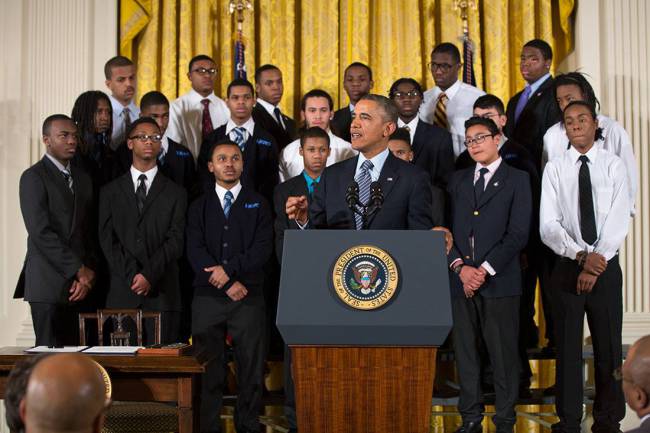Focus Policy Blog

Harnessing the Promise: How to Accelerate the Potential of the White House “My Brother’s Keeper” Initiative
Relative to their white peers, boys and men of color face deeply inequitable life circumstances and outcomes, as measured by disparities across a range of sectors, such as education, employment, health and reproductive health, and juvenile and criminal justice involvement. Today President Obama announced the Task Force Report for the White House “My Brother’s Keeper” initiative, which aims to build public- and private-sector partnerships to improve life opportunities for boys and men of color. This represents an historic and vitally important opportunity to mobilize stakeholders and take action to embrace our young men – but its success hinges on our collective ability to understand how we as a nation have responded to this population, and how we address their needs going forward.
A host of historic and contemporary factors contribute to inequitable opportunities for boys and men of color, resulting in adverse health behaviors, constrained access to resources, and shortened life expectancy. Persistent residential segregation—an enduring legacy of de jure and de facto Jim Crow policies and practices that are reinforced by current housing discrimination and housing policies—concentrates these young men in high-poverty communities, where there are few jobs and few role models that present boys with reasons for optimism about their lives.
Residential segregation also exposes boys and men of color to high levels of crime, as well as domestic and neighborhood violence, which inhibits the development of healthy relationships, successful coping, and conflict-resolution skills. Deepening school segregation consigns a disproportionate share of boys of color to failing school systems that struggle to prepare youth for educational excellence and advancement. In contrast, many of these schools employ policies and practices that increase the likelihood of school dropout (e.g., through draconian school disciplinary policies) and non-persistence.
And many boys and men of color, deprived of opportunities for full participation in the economic and political life of their communities, find themselves seeking income through the underground economy, thinking only in terms of short-term needs, and starting families with partners with whom they are poorly prepared to raise children.
To address limited opportunities for men of color, in 2005 the Joint Center for Political and Economic Studies launched the Dellums Commission to analyze obstacles commonly confronted by young men of color, and to identify effective policies and practices that could help them enjoy a more successful path in life. The Commission was chaired by former Oakland Mayor Ronald V. Dellums, a social worker by training who served with distinction as a member of the U.S. House of Representatives from 1971 to 1998. The other members of the Commission included a diverse group of state legislators, judges, educators, human rights activists, corporate executives, religious leaders, and representatives from the African-American, Latino, American-Indian, and Asian-American communities.
The Commission sought to address actionable solutions, directing their attention on a new way forward, beyond diagnosis, organizing ideas and policies to form an urgent agenda. They commissioned a series of studies by leading experts to identify national, state, and local policies in the areas of health and mental health services, juvenile justice and criminal justice, and family support and child welfare. The result of these studies was a comprehensive policy agenda and a powerful group of recommendations designed to ignite reforms that would enhance the well-being of communities of color and demonstrate that government, business, communities, and individuals can work together to eliminate barriers faced by boys and men of color.
Building on the success of the Dellums Commission, we must re-ignite our efforts to implement effective policy change by building coalitions that will unite labor, industry, science, public health, religious leaders, philanthropists, foundations, and elected officials in a consortium to improve life opportunities for boys and men of color. Advancements in opportunity for boys and men of color at local and national levels will occur only when we comprehensively address the major forces impeding progress: inequitable life opportunities structured along geographical and racial lines (e.g., residential and school segregation); inadequate public demand for action, buttressed by explicit and implicit negative views and biases against the population (e.g., as reinforced through news media, entertainment, and popular culture); and a lack of leadership opportunities for boys and men of color that can help them elevate their voices in civic discourse, mentor succeeding generations, and change cultural norms and practices among their peers.
Given rapid demographic shifts, our nation needs to harness the talents and leadership of boys and men of color if we are to remain a strong, vibrant democracy. My Brother’s Keeper is an important step toward this goal. Let’s use this moment to build a new future for our young men.
Brian Smedley, Ph.D., Vice President and Director of the Joint Center’s Health Policy Institute
Jermane Bond, Ph.D., Research Scientist and Director of the Commission on Paternal Involvemtn in Pregnancy Outcomes

